高中英语北师大版选择性Unit5EducationLesson1EnlighteningaMind学
【优质教案】师大选择性必修Unit 5 Education Lesson 1 精品教案6
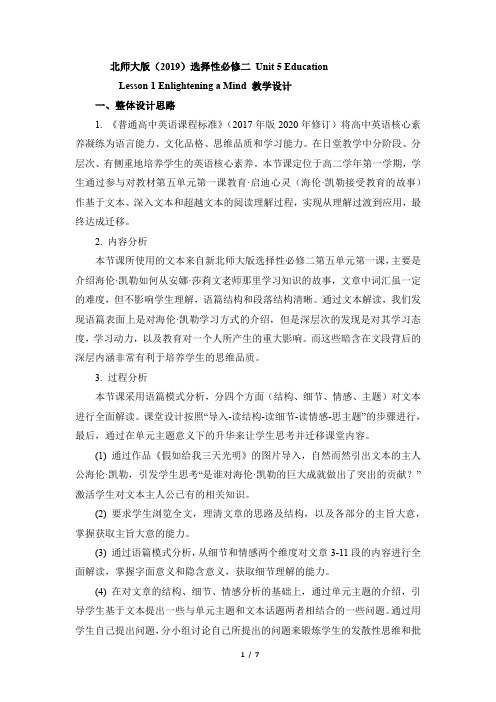
北师大版(2019)选择性必修二Unit 5 EducationLesson 1 Enlightening a Mind 教学设计一、整体设计思路1. 《普通高中英语课程标准》(2017年版2020年修订)将高中英语核心素养凝练为语言能力、文化品格、思维品质和学习能力。
在日堂教学中分阶段、分层次、有侧重地培养学生的英语核心素养。
本节课定位于高二学年第一学期,学生通过参与对教材第五单元第一课教育·启迪心灵(海伦·凯勒接受教育的故事)作基于文本、深入文本和超越文本的阅读理解过程,实现从理解过渡到应用,最终达成迁移。
2. 内容分析本节课所使用的文本来自新北师大版选择性必修二第五单元第一课,主要是介绍海伦·凯勒如何从安娜·莎莉文老师那里学习知识的故事,文章中词汇虽一定的难度,但不影响学生理解,语篇结构和段落结构清晰。
通过文本解读,我们发现语篇表面上是对海伦·凯勒学习方式的介绍,但是深层次的发现是对其学习态度,学习动力,以及教育对一个人所产生的重大影响。
而这些暗含在文段背后的深层内涵非常有利于培养学生的思维品质。
3. 过程分析本节课采用语篇模式分析,分四个方面(结构、细节、情感、主题)对文本进行全面解读。
课堂设计按照“导入-读结构-读细节-读情感-思主题”的步骤进行,最后,通过在单元主题意义下的升华来让学生思考并迁移课堂内容。
(1) 通过作品《假如给我三天光明》的图片导入,自然而然引出文本的主人公海伦·凯勒,引发学生思考“是谁对海伦·凯勒的巨大成就做出了突出的贡献?”激活学生对文本主人公已有的相关知识。
(2) 要求学生浏览全文,理清文章的思路及结构,以及各部分的主旨大意,掌握获取主旨大意的能力。
(3) 通过语篇模式分析,从细节和情感两个维度对文章3-11段的内容进行全面解读,掌握字面意义和隐含意义,获取细节理解的能力。
(4) 在对文章的结构、细节、情感分析的基础上,通过单元主题的介绍,引导学生基于文本提出一些与单元主题和文本话题两者相结合的一些问题。
Unit5Education单元整体教学设计课件-高中英语北师大版选择性

说明文 介绍Maria Montessori及她所倡导的蒙氏教育
PART 02
单元主题与单元结构的生成
单元主题
Topic Talk
子主题1:什么是教育?
L3 Reading Understanding
子主题4:教 L 4 Writing 育如何培养人 A Picture 的思维品质? description
子主题2:教 育能产生什
么影响?
L1 Reading Enlightening A
Mind
Reading Club1 From Slates to Tablets
单元结构
Topic Talk 教育家对教育的理解,学
习的方式和步骤
认识教育
L2 Listening: The Objectives of
访谈+对话
Reading 1
故事
Listening
对话+讲座
Reading 2
议论文
Reading & Writing 看图写作
Viewing
采访
Reading Club 1 说明文
Reading Club 2 说明文
01 语篇内容与主题梳理
教育的意义 内涵和目的
教育的方式和步骤
01 语篇内容与主题梳理
介绍Maria Montessori个人生平、成就及她所倡导 的蒙氏教育理念、方法和面临的问题。
Subthemes
教育的方式与影响
语篇通过对比惊喜今昔对于获取知识和理解世界的不同 观念,论述了人们对于世界的认识是不断发展的,启示 我们要保持开放的态度去不断求知,不能一味地相信权 威。
北师大版高中英语选择性必修2 UNIT 5 EDUCATION

美文导入
核心素养目标
英语 选择性 必修第二册 配北师大版
UNIT 5 EDUCATION
○句型精析
What I enjoyed most was that I had culture classes where I could learn about Chinese calligraphy,Beijing opera,Chinese literature,Chinese cooking and many more subjects.
美文导入
核心素养目标
英语 选择性 必修第二册 配北师大版
UNIT 5 EDUCATION
分析:本句中“What I enjoyed most”为主语从句;“that I had culture… many more subjects”为表语从句;“where I could learn about Chinese calligraphy , Beijing opera , Chinese literature,Chinese cooking and many more subjects”为定语从 句,先行词为“culture classes”。
美文导入
核心素养目标
英语 选择性 必修第二册 配北师大版
UNIT 5 EDUCATION
I went to China in the summer of 2017.My time there was an impressive experience. Everyday was a new adventure. What I enjoyed most was that I had culture classes where I could learn about Chinese calligraphy,Beijing opera,Chinese literature, Chinese cooking and many more subjects. The mix of learning about the language and culture made each day of class enjoyable.
高中英语北师大版选择性必修第二册Unit5EducationLesson1Enlighteninga

一、根据首字母填写单词(单词拼写)1. p______ help or encourage something to happen.(根据首字母单词拼写)2. With the approaching of Hangzhou Asian Games, the city’s subway system has greatly enhanced, which f________ travel for local residents, as it does in the case of all the faculties and students at HFLS who find it convenient to take a subway ride to urban areas. (根据首字母拼写单词)3. The school attaches great s______ to education on traditional Chinese culture. (根据首字母单词拼写)二、根据汉语意思填写单词(单词拼写)4. The doctor insisted that the patient ________ (operate)on immediately.(所给词的适当形式填空)5. As an ________ (教育工作者), people often ask me how I know what is going on in the minds of my students. (根据汉语提示单词拼写)6. _______(一致的) eating habits are better for our health. It is also better to eat a_______(谦虚的) amount of food each time. (根据汉语提示单词拼写)三、根据中英文提示填写单词(单词拼写)7. The new airport will f________ (促进) the development of tourism. (根据中英文提示填空)8. Our heartfelt s_________ (同情) goes out to the victims of the war. (根据中英文提示单词拼写)四、完成句子9. 听到你被提升为公司的销售经理,我感到非常高兴。
北师大版(2023)选择性必修第二册 Unit 5 Education Lesson 1 Enli
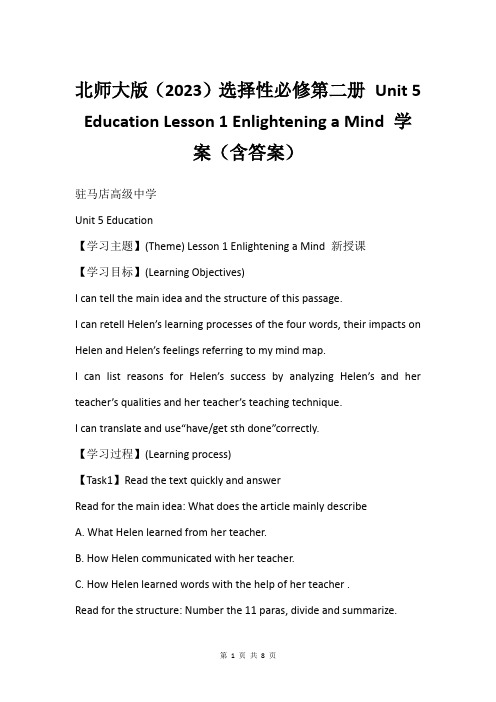
北师大版(2023)选择性必修第二册Unit 5 Education Lesson 1 Enlightening a Mind 学案(含答案)驻马店高级中学Unit 5 Education【学习主题】(Theme) Lesson 1 Enlightening a Mind 新授课【学习目标】(Learning Objectives)I can tell the main idea and the structure of this passage.I can retell Helen’s learning processes of the four words, their impacts on Helen and Helen’s feelings referring to my mind map.I can list reasons for Helen’s success by analyzing Helen’s and her teacher’s qualities and her teacher’s teaching technique.I can translate and use“have/get sth done”correctly.【学习过程】(Learning process)【Task1】Read the text quickly and answerRead for the main idea: What does the article mainly describeA. What Helen learned from her teacher.B. How Helen communicated with her teacher.C. How Helen learned words with the help of her teacher .Read for the structure: Number the 11 paras, divide and summarize.Part I: Para ( -) Background informaton about______________and ________.Part II: Para ( -)How Helen learned the words which could_________, such as “doll” and_____.Part III: Para ( -)How Helen learned the words which couldn’t________, such as_____and_____.【Task 2】Pair Work: Read Part 1 I was simply making my fingers go in monkey-like imitation...... I remember the morning that I first asked the meaning of the word “love”. This was before I knew many words. I had found a few early violets in the garden and brought them to my teacher ... Miss Sullivan put her arm gently around me and wrote on my hand, “I love Helen”. “What is love ” I asked. She drew me closer to her and saide, “It is here,”pointing to my heart ... Her words puzzled me very much because I did not then understand anything unless I touched it...... In a flash I knew that the word was the name of the process that was going on in my mind.... “You cannot touch the clouds, you know; but you feel the rain...You cannot touch love either; but you feel the sweetness that it pours into everything. Without love you would not be happy or want to play.”...Famous sayings by Helen KellerThe best and most beautiful things in the world cannot be seen or even touched. They must be felt within the heart.这个世界最好和最美的事物我们无法用肉眼看到或用手触摸到,我们只能用心去感受。
Unit 5 Lesson 1(教学课件)-高中英语北师大版(2019)选择性必修第二册
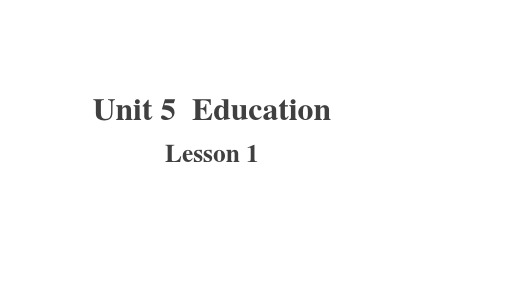
Language points
tolerate vt. 容忍,忍受 to accept sb/sth that is annoying, unpleasant, etc. without complaining There is a limit to what one person can tolerate. put up with=tolerate I don’t know how she puts up with him
You’re wasting my precious time! 你在浪费我的宝贵的时间! 【近义词】 valued adj. 重要的;宝贵的;贵重的 【词语辨析】precious, valuable valuable 指有相当价值,可高价出售的,或有用、有益的 东西。 precious 指因稀罕、不易得到而很值钱,或因本the rules
have/get sth done
We use the structure have/get sth done when we want to say that we ask someone else to do something for us. e.g. I fixed the washing machine. (I did it myself.) I had my washing machine fixed. (I asked someone to fix it for me.)
Exploring the rules
tense
present simple past simple
present continuous past continuous present perfect past perfect simple future
【优质教案】师大选择性必修Unit 5 Education Lesson 1 精品教案 2
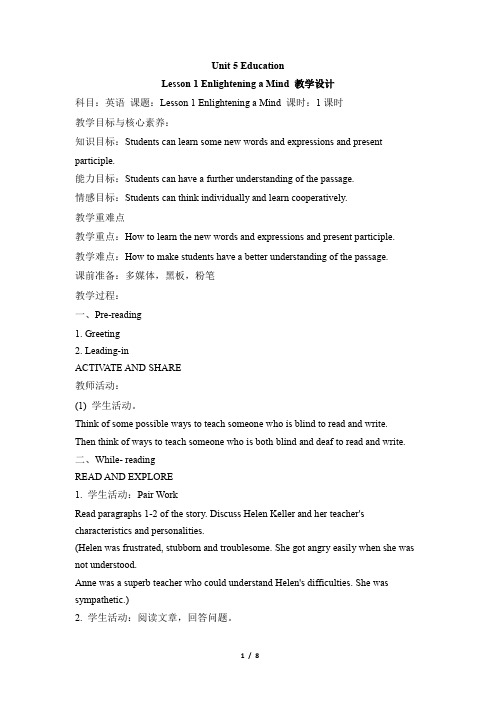
Unit 5 EducationLesson 1 Enlightening a Mind 教学设计科目:英语课题:Lesson 1 Enlightening a Mind 课时:1课时教学目标与核心素养:知识目标:Students can learn some new words and expressions and present participle.能力目标:Students can have a further understanding of the passage.情感目标:Students can think individually and learn cooperatively.教学重难点教学重点:How to learn the new words and expressions and present participle.教学难点:How to make students have a better understanding of the passage.课前准备:多媒体,黑板,粉笔教学过程:一、Pre-reading1. Greeting2. Leading-inACTIV ATE AND SHARE教师活动:(1) 学生活动。
Think of some possible ways to teach someone who is blind to read and write. Then think of ways to teach someone who is both blind and deaf to read and write.二、While- readingREAD AND EXPLORE1. 学生活动:Pair WorkRead paragraphs 1-2 of the story. Discuss Helen Keller and her teacher's characteristics and personalities.(Helen was frustrated, stubborn and troublesome. She got angry easily when she was not understood.Anne was a superb teacher who could understand Helen's difficulties. She was sympathetic.)2. 学生活动:阅读文章,回答问题。
Unit5EducationTopicTalkLesson1语言知识清单-高中英语北师大版选择性
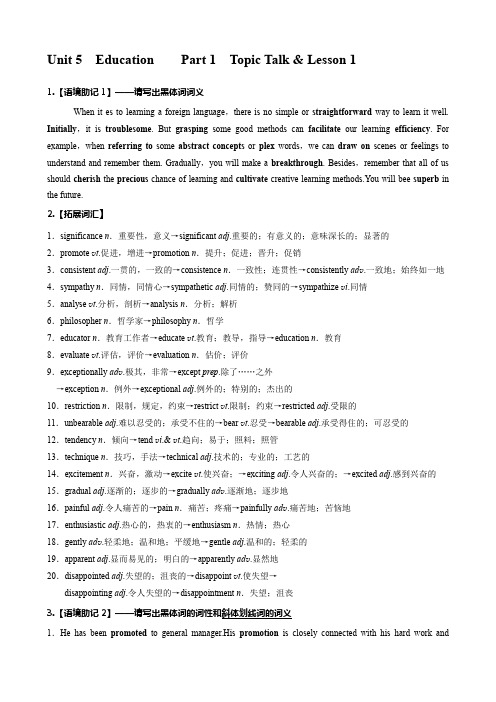
Unit 5 Education Part 1Topic Talk & Lesson 11.【语境助记1】——请写出黑体词词义When it es to learning a foreign language,there is no simple or straightforward way to learn it well. Initially,it is troublesome. But grasping some good methods can facilitate our learning efficiency. For example,when referring to some abstract concepts or plex words,we can draw on scenes or feelings to understand and remember them. Gradually,you will make a breakthrough. Besides,remember that all of us should cherish the precious chance of learning and cultivate creative learning methods.You will bee superb in the future.2.【拓展词汇】1.significance n.重要性,意义→significant adj.重要的;有意义的;意味深长的;显著的2.promote v t.促进,增进→promotion n.提升;促进;晋升;促销3.consistent adj.一贯的,一致的→consistence n.一致性;连贯性→consistently ad v.一致地;始终如一地4.sympathy n.同情,同情心→sympathetic adj.同情的;赞同的→sympathize v i.同情5.analyse v t.分析,剖析→analysis n.分析;解析6.philosopher n.哲学家→philosophy n.哲学7.educator n.教育工作者→educate v t.教育;教导,指导→education n.教育8.evaluate v t.评估,评价→evaluation n.估价;评价9.exceptionally ad v.极其,非常→except prep.除了……之外→exception n.例外→exceptional adj.例外的;特别的;杰出的10.restriction n.限制,规定,约束→restrict v t.限制;约束→restricted adj.受限的11.unbearable adj.难以忍受的;承受不住的→bear v t.忍受→bearable adj.承受得住的;可忍受的12.tendency n.倾向→tend v i.& v t.趋向;易于;照料;照管13.technique n.技巧,手法→technical adj.技术的;专业的;工艺的14.excitement n.兴奋,激动→excite v t.使兴奋;→exciting adj.令人兴奋的;→excited adj.感到兴奋的15.gradual adj.逐渐的;逐步的→gradually ad v.逐渐地;逐步地16.painful adj.令人痛苦的→pain n.痛苦;疼痛→painfully ad v.痛苦地;苦恼地17.enthusiastic adj.热心的,热衷的→enthusiasm n.热情;热心18.gently ad v.轻柔地;温和地;平缓地→gentle adj.温和的;轻柔的19.apparent adj.显而易见的;明白的→apparently ad v.显然地20.disappointed adj.失望的;沮丧的→disappoint v t.使失望→disappointing adj.令人失望的→disappointment n.失望;沮丧3.【语境助记2】——请写出黑体词的词性和斜体划线词的词义1.He has been promoted to general manager.His promotion is closely connected with his hard work andexcellent ability.2.It was an exceptionally cold day when we visited the town.What relieved us was that the scenery there was really exceptional.3.The theatre doesn’t set any restriction to adults.But the children are restricted by their age or other aspects. 4.From his disappointed expression,we could tell that the film was very disappointing and he was disappointed at it.6.People tend to get fatter as they grow older.However,we can take some measures to avoid this tendency. 7.He was excited to hear the news that he was admitted into a key university.The news caused great excitement among his friends.4.【核心短语】1.devote...to...把……用于;致力于2.a great deal of大量,很多3.adapt to使适合,适应4.meet one’s needs满足某人的需要5.pass on 传递6.be consistent with与……一致7.have a tendency to有……的倾向8.relate to涉及;理解,认同9.hold up举起;阻挡;拦截10.now that既然;由于11.be eager to do sth.渴望做某事12.be enthusiastic about热衷于,对……充满热情13.point to指向;表明14.work on继续工作;致力于……15.with the help of 在……的帮助下16.in a flash一瞬间;立刻17.e out出现;出版;结果是短语块记第一组(pass短语)pass away去世,逝世pass by 经过;(时间)过去第二组(hold短语)hold out 伸出hold back阻止hold on 坚持;不挂断( )第三组(e 短语)e on 快点,加油e about 发生e to oneself 苏醒,恢复知觉e up with sth. 提出某事(物)。
Unit5EducationLesson1EnlighteningaMind课件高二英语北师大版选择
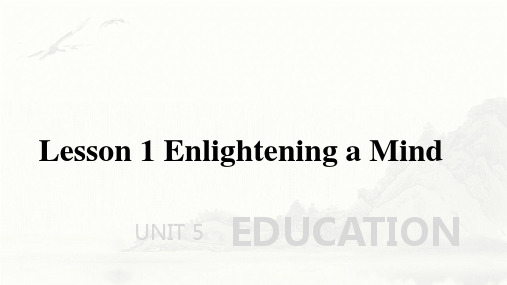
Activity 2 Careful reading Ⅰ. Read para. 1 and answer the following questions. 1.Who is Helen Keller? Helen Keller was an exceptionally special girl who still couldn’t speak,read or write and needed to have everything done for her by the time she was seven years old. 2.What makes her special? She couldn’t see or hear. 3.How about Helen Keller’s characteristics and personalities? She was troublesome,stubborn and got angry easily when no one understood her.
4.Which words were easier to learn?Which were more difficult?Explain why. (1)The words “doll” and “water” were easier to learn,because Helen could touch them. (2)The words “love” and “think” were more difficult , because they were complex and abstract concept and couldn’t be touched.
In a flash,Helen (6)_k_n_e_w__t_h_a_t _th_e__w_o_r_d_w__as__th_e__n_a_m_e__o_f _th_e__p_ro_c_e_s_s_t_h_a_t _w_a_s
Unit5Lesson1EnlighteningaMind课件高中英语北师大版选择性
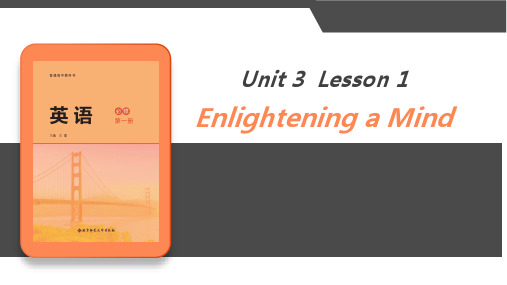
Task 2 Read Part 1 & Answer
✓ Why was Helen an “exceptionally special” girl before Anne came? ✓ Why was Anne a “superb” teacher for Helen?
Task 1 Read the text quickly and answer
✓ Read for the main idea: What does the article mainly describe?
✓ Read for the structure: Number the 11 paras, divide and summarize.
Task 3 Read Part 2, 3 & draw a mind map.
How Helen learned each word ( learning processes ) How Helen felt about learning each word ( feelings ) The significance of learning each word ( impacts on Helen)
Task 4 Group Work What contributes to Helen Keller a success? Find evidence
the good qualities of Helen Keller herself
Unit 5 Education Lesson 1(教学课件)-高中英语北师大版(2019)

Read paragraphs 1-2 of the story. Discuss Helen Keller and her teacher’s characteristics and personalities.
Reading (1) Who is Helen Keller?
(2) What makes her special? (3) Why did she break things? (4) What do you think about her teacher?
Reading The story can be divided into three parts.
The first part is paragraph 1, about Helen.
The second part is paragraph 2, about Anne.
The third part is from paragraph 3 to paragraph 12, about how Helen learnt words.
④ For the word “think” When Helen was trying to solve a difficult problem, Anne _to_u_c_hed _H__e_le_n_’s_f_o_r_e_h_ea_d__a_n_d_w_r_o_t_e_t_h_e_w_o_r_d_“_t_h_in_k_”__o_n_h_e_r_h_a_n_d_________. In a flesh, Helen _k_n_o_w__t_h_at_t_h_e_w__o_rd__w_a_s_t_h_e_n_a_m_e__o_f_t_h_e_p_r_o_c_e_ss__ _th_a_t_w_a_s_g_o_i_n_g_o_n__in__h_e_r _h_e_ad________________________________.
Unit5Education单词默写本高中英语北师大版选择性

Unit 5 EducationTopic Talk1. _____________ n. 重要性,意义2. _____________ vt. 促进,增进3. _____________ vt. 促进;使便利4. _____________ adj. 一贯的,一致的5. _____________ vt. 培养,养成(技能、态度或素质)6. _____________ n. 同情,同情心7. _____________ 人类8. _____________ vt. 分析,剖析9. _____________ n. 哲学家10. _____________ n. 教育工作者11. _____________ vi. 坚称;坚持主张12. _____________ vt. 评估,评价Lesson 113. _____________ vt. 启迪;指导,教导14. _____________ adv. 极其,非常15. _____________ adj. 很严重的16. _____________ n. 限制,规定,约束17. _____________ adj. 难以忍受的;承受不住的18. _____________ adj. 引起麻烦的;令人烦恼的19. _____________ adj. 固执的,执拗的;倔强的20. _____________ n. 倾向21. _____________ adj. 极好的,卓越的22. _____________ n. 视力23. _____________ vi. 理解;相联系24. _____________ n. 技巧,手法25. _____________ adj. 简单的,易懂的;诚实的,坦率的26. _____________ n. 玩偶27. _____________ adv. 起初28. _____________ n. 兴奋,激动29. _____________ n. 模仿,仿效30. _____________ n. 水流31. _____________ n. 液体32. _____________ adj. 宝贵的33. _____________ vt. 理解,领会34. _____________ adj. 逐渐的,逐步的35. _____________ adj. 令人痛苦的;困难的;疼痛的36. _____________ adj. 热心的,热衷的37. _____________ n. 词汇量38. _____________ vi. &vt. (使)扩大;增加39. _____________ adj. 复杂的;难以理解的40. _____________ n. 紫罗兰41. _____________ adv. 轻柔地;温和地;平缓地42. _____________ vt. 使困惑,使迷惑43. _____________ adj. 显而易见的;明白的44. _____________ n. (太阳或月亮的)光线45. _____________ adj. 失望的,沮丧的46. _____________ adj. 抽象的47. _____________ n. 概念;想法48. _____________ n. 突破;重大进展49. _____________ n. 项链50. _____________ n. 额,前额51. _____________ adj. 生动的,逼真的Lesson 252. _____________ n. 目的,目标adj. 客观的53. _____________ vt. 获得,赢得,取得;受益54. _____________ adj. 多面的,全面的55. _____________ vt. 追求56. _____________ adj. 批评的,批判的57. _____________ n. 认识,认知58. _____________ adj. 核心的59. _____________ n. 洞察力;顿悟60. _____________ adj. 文明的,有礼貌的;公民的61. _____________ n. 正直,诚实;完整62. _____________ n. 拉丁语63. _____________ vt. 教育;教导,指导64. _____________ adj. 道德(上)的65. _____________ n. 获得,习得66. _____________ vi. &vt. 奉献,捐献67. _____________ n. 金融;财政68. _____________ n. 经济学69. _____________ vt. 使接触;使体验;使暴露;揭露70. _____________ adj. 四周的,附近的71. _____________ adv. 无鉴别力地;不加批评地72. _____________ n. 判断力;意见,评价;判决73. _____________ adv. 不管;不顾74. _____________ vi. 表现75. _____________ n. 境况,状况;情况,情形76. _____________ n. 公民;市民77. _____________ n. 结论78. _____________ 最后79. _____________ n. 定义,释义80. _____________ adv. 各自地81. _____________ n. 责任82. _____________ n. 优先处理的事;优先权83. _____________ vt. 刺激,促使,促进84. _____________ n. 主动性85. _____________ adj. 自主的;自治的86. _____________ adj. 聪颖的,才华横溢的87. _____________ vt. 展示;说明88. _____________ vt. 评价Lesson 389. _____________ adj. 显然的,明显的;易理解的90. _____________ n. 分析91. _____________ n. 等级92. _____________ adj. 皇家的;王室的93. _____________ adj. 效率低的94. _____________ adj. 有价值的;值得尊敬的95. _____________ n. 教会;教堂96. _____________ n. 宇宙97. _____________ adj. 原始的98. _____________ (_____________) 公元前99. _____________ vt. 赞成;赞许;批准100. _____________ vt. 强烈要求;敦促101. _____________ n. 监狱102. _____________ vt. 放弃;抛弃103. _____________ n. 假定,假设104. _____________ adj. 受尊敬的,受敬重的105. _____________ n. 智慧106. _____________ vt. 有……是由于;把……归功于107. _____________ n. 阴影108. _____________ adj. 守旧的;传统的109. _____________ n. 王国110. _____________ n. 文明111. _____________ adj. 极其重要的,必不可少的112. _____________ adj. 有利的,有帮助的113. _____________ n. 人类Writing Workshop114. _____________ n. 围裙115. _____________ vt. 名为……;使有权利116. _____________ vt. 意味着……117. _____________ n. 惯例,常规;例行公事118. _____________ n. 运动119. _____________ adj. 全部的120. _____________ n. 时间表,日程表;时刻表121. _____________ adj. 全神贯注的Reading Club 1122. _____________ n. 设施,设备Reading Club 2123. _____________ n. 思想体系;哲学124. _____________ vt. 约束,限制125. _____________ vt. 排列,布置。
Unit5Lesson1Englighteningamind课件高中英语北师大版选择性

在…的帮助下
made some mistakes.犯错误
感叹句:such a/an+adj.+n. so+adj.+a/an+n.
一个多么adj.的n.呀/啊
She is such a lovely girl. She is so lovely a girl.
瞬间
the word was the name of the process (that was going on in my
head.”)
正在进行的 that引 返回到
感叹句:such a/an+adj.+n.
(flowing over her hand). This precious knowledge gave
现在分词短语作后置定语,修饰liquid
her hope and joy. Finally, she got (the world of words)
opened up to her.
打开
get sth done 让某事被做
亦步亦趋的模仿
井
放
When they were at the well one day, Anne put one
of Helen’s hands under the stream of water. As the
水流
当...时候
water flowed over Helen’s hand, Anne spelt out
由于,因为
=tend to do倾向于 break-broke-broken打破,打碎
师大选择性必修Unit 5 Education Lesson 1 精品教案
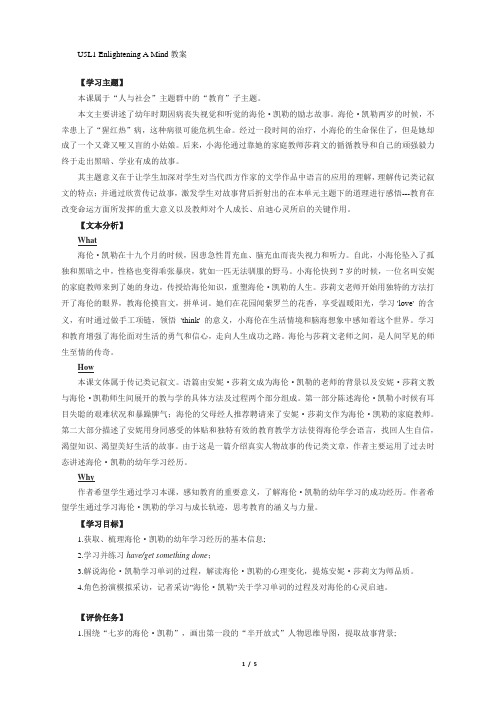
U5L1 Enlightening A Mind教案【学习主题】本课属于“人与社会”主题群中的“教育”子主题。
本文主要讲述了幼年时期因病丧失视觉和听觉的海伦·凯勒的励志故事。
海伦·凯勒两岁的时候,不幸患上了“猩红热”病,这种病很可能危机生命。
经过一段时间的治疗,小海伦的生命保住了,但是她却成了一个又聋又哑又盲的小姑娘。
后来,小海伦通过靠她的家庭教师莎莉文的循循教导和自己的顽强毅力终于走出黑暗、学业有成的故事。
其主题意义在于让学生加深对学生对当代西方作家的文学作品中语言的应用的理解,理解传记类记叙文的特点;并通过欣赏传记故事,激发学生对故事背后折射出的在本单元主题下的道理进行感悟---教育在改变命运方面所发挥的重大意义以及教师对个人成长、启迪心灵所启的关键作用。
【文本分析】What海伦·凯勒在十九个月的时候,因患急性胃充血、脑充血而丧失视力和听力。
自此,小海伦坠入了孤独和黑暗之中,性格也变得乖张暴戾,犹如一匹无法驯服的野马。
小海伦快到7岁的时候,一位名叫安妮的家庭教师来到了她的身边,传授给海伦知识,重塑海伦·凯勒的人生。
莎莉文老师开始用独特的方法打开了海伦的眼界,教海伦摸盲文,拼单词。
她们在花园闻紫罗兰的花香,享受温暖阳光,学习'love' 的含义,有时通过做手工项链,领悟'think' 的意义,小海伦在生活情境和脑海想象中感知着这个世界。
学习和教育增强了海伦面对生活的勇气和信心,走向人生成功之路。
海伦与莎莉文老师之间,是人间罕见的师生至情的传奇。
How本课文体属于传记类记叙文。
语篇由安妮·莎莉文成为海伦·凯勒的老师的背景以及安妮·莎莉文教与海伦·凯勒师生间展开的教与学的具体方法及过程两个部分组成。
第一部分陈述海伦·凯勒小时候有耳目失聪的艰难状况和暴躁脾气;海伦的父母经人推荐聘请来了安妮·莎莉文作为海伦·凯勒的家庭教师。
- 1、下载文档前请自行甄别文档内容的完整性,平台不提供额外的编辑、内容补充、找答案等附加服务。
- 2、"仅部分预览"的文档,不可在线预览部分如存在完整性等问题,可反馈申请退款(可完整预览的文档不适用该条件!)。
- 3、如文档侵犯您的权益,请联系客服反馈,我们会尽快为您处理(人工客服工作时间:9:00-18:30)。
一.长难句解读
1. In a flash I knew that the word was the name of the process that was going on in my head.
分析:本句为复合句,that the word was the name of the process that was going on in my head是从句,其中that was going on in my head是,修饰先行词the process。
学习笔记
学 习 活 动
Before reading
Key words:
plex
4.violet5.gently6.puzzle
7.apparent8.ray9.disappointed
10.abstract11.concept12.breakthrough
When I came back home, my mother had had/got my computer repaired
译;
B. To show how bright Helen was though she was not in good health.
C. To set an example for students to understand abstract terms.
D. To show how Sullivan taught Helen to understand abstract terms.
C.was almost the same age as Helen
D.was very clever
2.When Helen learned the word, she began to understand her teacher was
telling her the meaning of the object.
13.necklace14.forehead15.vivid
While reading
Choose the correct answers.
1.Anne Sullivan could understand Helen well because she .
A.was a doctor
B.had had eyesight problems early in life
We're having our car repaired.译:
过去进行时was having/was getting sth.done
When I passed by his office,I heard that my teacher was having/getting the thing
explained to him why David was often late recently
6.Why did Helen often break things?
A. She wasn't understood by others. B. She couldn't explain herself in words.
C. She wanted to show her existence. D. She wasn't satisfied with her parents.
Unit5 Lesson1 Enlightening a Mind
课 题:
课型:
任务目标:
1. Train reading skills.
2. Learn to use have/ get something done to express meaning.
重点难点:Learn to Nhomakorabease have/ get something done to express meaning.
A.making necklaceB.making a doll
C.playing in the parkD.seeing the sun coming out
5.The words“love” and “think” are all.
A.objectiveB.abstract C.materialD.Subjective
译:
2.Her words puzzled me very much because I did not then understand anything unless I
touched it.
分析:本句为复合句,Her words puzzled me very much是主句;because I did not then understand anything unless I touched it是从句,其中该从句又是一个主从复合句,unless I touched it是从句。
A.waterB.love
C.dollD.Think
3.Of the following words, which is the most difficult for Helen to learn?
A.Water.B.Love.
C.Think.D.Sun.
4.When, Helen learned the meaning of“think”.
译:
二.Have/Get Something Done
Fill in the blanks
By the time she was seven years old, she still couldn't speak, read or write and needed to
have everything(do)
1.Helen's parents got a superb teacher(recommend) to them, a
Woman named Anne Sullivan
知识点1用法
have/get something done结构表示要别人为自己做某事;在此结构中,something作宾语,done作宾补,something与do之间存在逻辑上的动宾关系
译:
现在完成时have had/got
I’m very touched to know that my teacher has had/got the teaching materials taken to
me as I am ill in the hospital.
译:
过去完成时had had/had got sth. done
We had the machine mended just now.
译:
The patient is going to have his temperature taken.
译:
知识点2基本形式
一般现在时have/get sth.done
I have/get my hair cut.译:
一般过去时had/got sth. done
He had/got his eyes examinedyesterday.译:
一般将来时will have/get sth. done
They will have/get the washing done at the laundry on the weekend.
译:
现在进行时is having/is getting sth.done
7.How did Sullivan teach Helen words at first?
A. Show Helen pictures or real objects.
B. Explain its meaning and ideas patiently.
C. Help Helen to feel the objects while teaching.
D. Try all kinds of methods and go to different places.
8.What's the purpose of mentioning the words "love”and "think"?
A. To prove what is the best way to teach a blind and deaf child.
